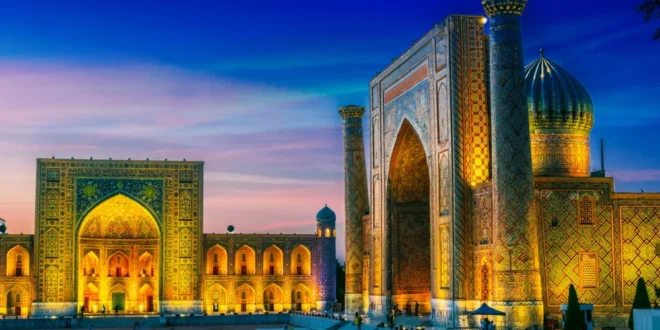Alybek Bakayev
As the Organization of Turkic States meets for its tenth anniversary, its members should realize their potential for connecting continents.
In today’s geopolitical landscape, it might seem that the world is becoming increasingly fragmented and divided. While this perception might hold true for global powers, a significant shift is quietly unfolding: the growing collaboration among Turkic states. This expanding unity presents new opportunities for Central Asian nations, which include four Turkic states. United by a common language, culture, and heritage, these countries, even as they maintain their distinct identities, are enhancing their joint political and economic influence. This can have broad economic and geopolitical implications beyond the region.
The deep-rooted history and the common linguistic and cultural bonds of the Turkic states—comprising Turkey, Azerbaijan, Kazakhstan, the Kyrgyz Republic, Turkmenistan, and Uzbekistan—form the foundation of our collaboration. Central to our pursuit of closer ties is economic interdependence, given Central Asia’s abundant mineral resources and energy reserves. By working together to harness these resources, we can boost our economies. Beyond economic pursuits, we also aim to address regional security issues, such as terrorism, border tensions, and drug trafficking.
For Central Asian countries, such as Kazakhstan, closer integration is advantageous. Kazakhstan has consistently implemented a multi-vector foreign policy, enabling us to foster positive relationships with all our neighbors in the Central Asian region, with Russia and China, as well as with Europe and the United States. Similarly, a unified Central Asia can boost regional cooperation and trade, benefiting the entirety of Eurasia.
Firstly, Turkic states, particularly Kazakhstan and Turkey, occupy strategic positions. Situated at the crossroads between East and West, Europe and Asia, these states can play crucial roles in facilitating trade between Asia and Europe via Central Asia. A notable initiative in this regard is the development of the Trans-Caspian Middle Corridor trade artery, which starts in Turkey and covers Georgia, Azerbaijan, the Caspian Sea, and Kazakhstan before reaching China. The Middle Corridor offers a route at least 2,000 kilometers shorter than the Northern Corridor, which passes through Russia, providing another alternative for connecting Asia and Europe.
Secondly, increased collaboration between Turkic states can support global energy security. With vast reserves of oil, gas, rare earth minerals, and a network of pipelines crisscrossing throughout the region, the Turkic Central Asian states are not only energy-rich but also control crucial energy transit routes. This places them at the nexus of global energy politics. In particular, the transfer of hydrocarbon resources from Central Asia through Turkey holds considerable significance for Europe’s energy security. In this context, the development of the Middle Corridor becomes essential.
Thirdly, security remains a crucial concern in today’s unpredictable global landscape, characterized by complex geopolitical rivalries and emerging threats. Many Turkic states have proactively pooled resources, expertise, and intelligence. For instance, Kazakhstan, with the support of other Turkic Central Asian nations, has been actively promoting initiatives to stabilize Afghanistan following the U.S. withdrawal. The aim is to foster stability and development in Afghanistan by engaging in dialogue with its current leadership, offering humanitarian aid to the Afghan people, and supporting infrastructure and education projects.
Recently, ties among the Turkic states have been gaining momentum. The Organization of Turkic States (OTS) has been pivotal in this. In November 2021, the OTS transformed from a council into a full-fledged international organization with expanded mandates and capabilities. With Eurasia as its backdrop, the upgraded OTS is poised to establish a significant presence. Its objectives encompass enhancing its geopolitical influence through deeper diplomatic relations among members and other global actors, driving economic partnerships that leverage the collective strengths of its member nations, and celebrating the rich cultural heritage of the Turkic world.
For Kazakhstan, the largest of the Central Asian states and current OTS chair, closer integration between Turkic states is of particular importance. In line with our multi-vector foreign policy, Kazakhstan seeks to strengthen its collaboration with fellow Turkic nations, paving the way for added diplomatic and economic cooperation. By deepening relationships with countries such as Turkey and Azerbaijan, Kazakhstan can play a pivotal role in enriching Eurasia through enhanced trade and political connections.
This is why, as chair of the OTS, Kazakhstan aims to intensify collaboration among Turkic nations, advocate for mutual opportunities, strengthen production and export alliances, and maintain stability and security within the OTS framework.
Leaders from the Turkic states are set to meet at the tenth-anniversary Summit of the OTS in Astana, the capital of Kazakhstan, on November 3. It is our goal that this gathering will spur even closer ties and cooperation among them. Although the world’s attention often centers on major global powers, the increasing collaboration between Turkic states, especially in sectors such as transport, logistics, energy, and security, is notable. This burgeoning Turkic integration could significantly impact Central Asia’s future, which would have a positive influence on the wider Eurasia, including on Asia and Europe.
Alibek Bakayev is the Deputy Minister of Foreign Affairs of Kazakhstan
 Geostrategic Media Political Commentary, Analysis, Security, Defense
Geostrategic Media Political Commentary, Analysis, Security, Defense





